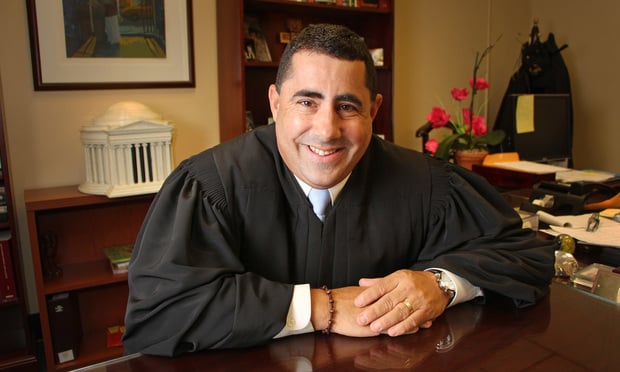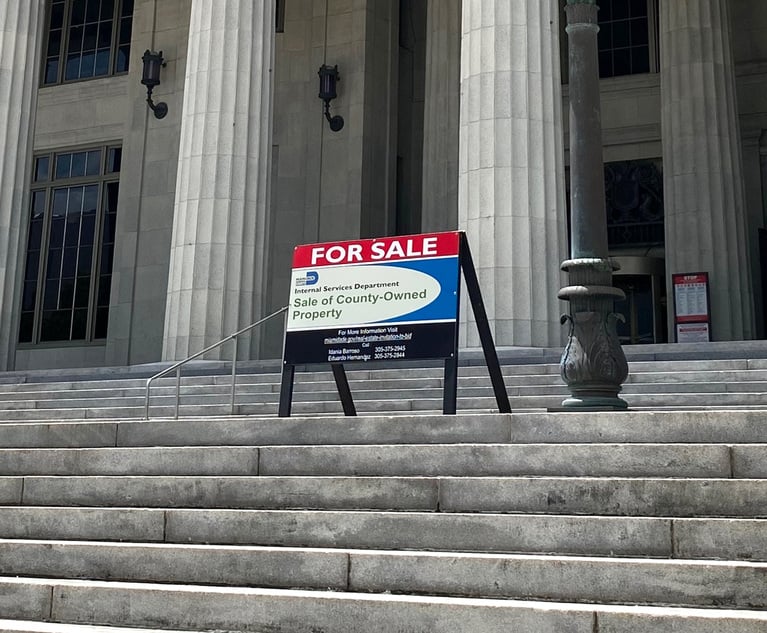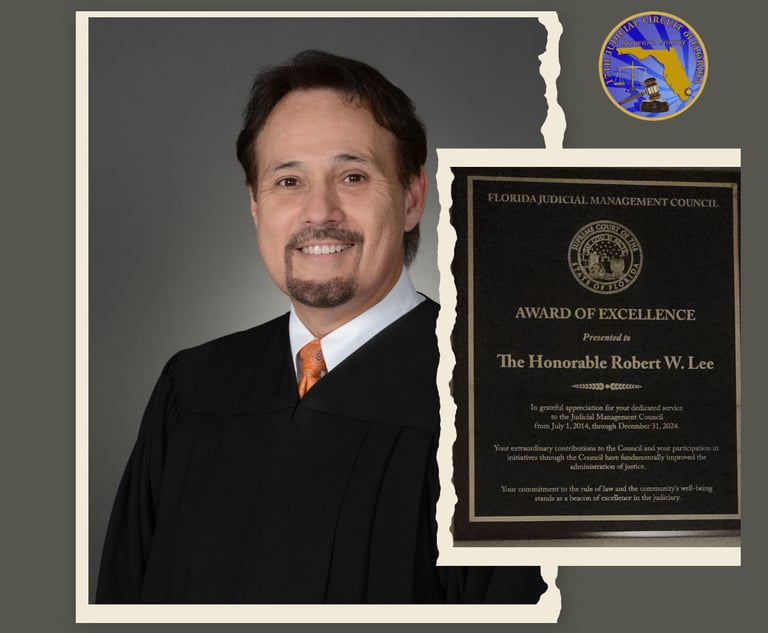Miami Judge Faces Suspension for Directing Racial Slurs at Black Defendants
The judge also discussed six pending cases with a defense attorney, who would later report him.
May 21, 2018 at 07:35 PM
5 minute read
 Miami-Dade Circuit Judge Stephen Millan. Photo: J. Albert Diaz/ALM
Miami-Dade Circuit Judge Stephen Millan. Photo: J. Albert Diaz/ALM Miami-Dade Circuit Judge Stephen Millan faces a 30-day suspension without pay, after admitting to using racial slurs to describe black defendants and their relatives.
The judge also repeatedly reached out by cellphone to the defendants' attorney after the incidents, but the lawyer said he was uncomfortable with the communication, and reported Millan for ethics violations. Millan discussed six pending cases with the attorney, and offered to “help out” by setting the cases for a plea hearing, according to the charging document.
The Investigative Panel of the Florida Judicial Qualifications Commission, which investigates ethics complaints against judges, recommended suspension, a public reprimand and $5,000 fine for the judge, who did not dispute the allegations. But the Florida Supreme Court has the final say on judicial discipline.
The case against Millan stems from two incidents involving an unnamed defense attorney.
In October 2016, that attorney was scheduling a hearing for a black defendant, when the judge “expressed indifference about scheduling, and in doing so, referred to the defendant as a 'moolie,'” according to the JQC's notice of formal charges issued to Millan and released late Monday.
“Moolie” is a Sicilian racial slur derived from the Italian word for eggplant. It is a derogatory term for people with dark skin.
“I cannot honestly say that I did not utter the terribly offensive word,” the JQC's findings and recommendations of discipline quotes Millan as saying. “I am embarrassed and genuinely
sorry.”
The judge did not respond to a request for comment Monday. And Miami-Dade Circuit Court spokeswoman Eunice Sigler declined to comment, referring all inquiries to the JQC.
The attorney who sparked the investigation told his supervisor about the incident, but did not report the judge ”out of a concern for potential ramifications to the client's case,” according to court filings in the judicial ethics proceedings.
“At the time of the commission's inquiry, you stated that you could not specifically recall this incident,” JQC Assistant General Counsel Alexander J. Williams wrote in the notice sent to Millan. “However, you 'do not deny the allegation,' and 'have no reason to believe the allegation is false.' You claimed that you were familiar with this particular slur, and that you
had used it intermittently as a 'youngster' growing up in New York.”
But about one year later, in October 2017, the same attorney said the judge again used demeaning language. He said he and an assistant state attorney were in an in-chambers discussion with Millan, when the judge allegedly became uneasy about a black defendant, relatives and potential witnesses remaining in the courtroom.
“During a break in a lengthy evidentiary hearing, you invited the attorneys for both parties into your chambers,” the notice of formal charges continued. “Once in your chambers, you instructed your bailiff to go retrieve your wallet from the courtroom because, 'I don't trust it in there with those thugs.'”
“The defendant's attorney, who believed that your remark was directed at the defendant's family and friends, protested your remark by telling you that the defendant's family and friends were good people,” the notice continued. “You made no response to the attorney's protest. At the time you made this statement, the only people present in the courtroom were court
personnel, corrections officers, the defendant, and the defendant's family and friends.”
The State Attorney's Office media relations staff could not immediately respond to inquiries looking to corroborate the complaint after business hours Monday.
But the lawyer at the heart of the complaints said the judge repeatedly attempted to reach him by cellphone, and then had a “protracted ex-parte conversation” about multiple pending criminal cases.
“You continued the ex-parte discussion despite the defense attorney's protest to you that he was not comfortable speaking about the cases without the prosecution present,” according to the notice of formal charges. “At one point during the conversation, you offered to 'help out' the defense attorney, by setting the cases for a plea hearing. You testified to the commission that although the defense attorney objected to discussing the cases without the prosecution, you thought the communications were permissible because you were discussing 'scheduling matters.'”
Millan never disclosed the ex parte conversation to prosecutors, and scheduled two of the six cases for hearing.
“The defense attorney filed motions to disqualify you in all of these cases based, in part, on the inappropriate conversation,” the charging notice reads. “You initially denied those motions as legally insufficient.”
Millan serves in the Miami-Dade's children's court division, according to the Eleventh Circuit's website. He rose to the bench after winning election in 2014 for a six-year term that started in January 2015 and is set to run until 2021. He was an assistant state attorney for about seven years before entering private practice in 1997 and then launching his own firm.
Millan told the Daily Business Review in 2015 that he became a lawyer because of his sister's birth defect and a judge because of a dying aunt.
“I, early on, wanted to be a lawyer because I saw what my parents went through,” he said at the time. “I didn't want other people to not have access to the system like they did. I didn't want them to not be heard and not be recognized the same way, because I saw their frustrations.”
Read the document:
This content has been archived. It is available through our partners, LexisNexis® and Bloomberg Law.
To view this content, please continue to their sites.
Not a Lexis Subscriber?
Subscribe Now
Not a Bloomberg Law Subscriber?
Subscribe Now
NOT FOR REPRINT
© 2025 ALM Global, LLC, All Rights Reserved. Request academic re-use from www.copyright.com. All other uses, submit a request to [email protected]. For more information visit Asset & Logo Licensing.
You Might Like
View All
Attorney Emerges as Possible Owner of Historic Miami Courthouse Amid Delays of New Building

A Judge Ordered Squabbling Lawyers to Have Lunch: Here's What Happened

Sorry. We Can't Get to Your Case: Judge Speaks Out on Judicial Shortages

Trailblazing Broward Judge Retires; Legacy Includes Bush v. Gore
Trending Stories
Who Got The Work
J. Brugh Lower of Gibbons has entered an appearance for industrial equipment supplier Devco Corporation in a pending trademark infringement lawsuit. The suit, accusing the defendant of selling knock-off Graco products, was filed Dec. 18 in New Jersey District Court by Rivkin Radler on behalf of Graco Inc. and Graco Minnesota. The case, assigned to U.S. District Judge Zahid N. Quraishi, is 3:24-cv-11294, Graco Inc. et al v. Devco Corporation.
Who Got The Work
Rebecca Maller-Stein and Kent A. Yalowitz of Arnold & Porter Kaye Scholer have entered their appearances for Hanaco Venture Capital and its executives, Lior Prosor and David Frankel, in a pending securities lawsuit. The action, filed on Dec. 24 in New York Southern District Court by Zell, Aron & Co. on behalf of Goldeneye Advisors, accuses the defendants of negligently and fraudulently managing the plaintiff's $1 million investment. The case, assigned to U.S. District Judge Vernon S. Broderick, is 1:24-cv-09918, Goldeneye Advisors, LLC v. Hanaco Venture Capital, Ltd. et al.
Who Got The Work
Attorneys from A&O Shearman has stepped in as defense counsel for Toronto-Dominion Bank and other defendants in a pending securities class action. The suit, filed Dec. 11 in New York Southern District Court by Bleichmar Fonti & Auld, accuses the defendants of concealing the bank's 'pervasive' deficiencies in regards to its compliance with the Bank Secrecy Act and the quality of its anti-money laundering controls. The case, assigned to U.S. District Judge Arun Subramanian, is 1:24-cv-09445, Gonzalez v. The Toronto-Dominion Bank et al.
Who Got The Work
Crown Castle International, a Pennsylvania company providing shared communications infrastructure, has turned to Luke D. Wolf of Gordon Rees Scully Mansukhani to fend off a pending breach-of-contract lawsuit. The court action, filed Nov. 25 in Michigan Eastern District Court by Hooper Hathaway PC on behalf of The Town Residences LLC, accuses Crown Castle of failing to transfer approximately $30,000 in utility payments from T-Mobile in breach of a roof-top lease and assignment agreement. The case, assigned to U.S. District Judge Susan K. Declercq, is 2:24-cv-13131, The Town Residences LLC v. T-Mobile US, Inc. et al.
Who Got The Work
Wilfred P. Coronato and Daniel M. Schwartz of McCarter & English have stepped in as defense counsel to Electrolux Home Products Inc. in a pending product liability lawsuit. The court action, filed Nov. 26 in New York Eastern District Court by Poulos Lopiccolo PC and Nagel Rice LLP on behalf of David Stern, alleges that the defendant's refrigerators’ drawers and shelving repeatedly break and fall apart within months after purchase. The case, assigned to U.S. District Judge Joan M. Azrack, is 2:24-cv-08204, Stern v. Electrolux Home Products, Inc.
Featured Firms
Law Offices of Gary Martin Hays & Associates, P.C.
(470) 294-1674
Law Offices of Mark E. Salomone
(857) 444-6468
Smith & Hassler
(713) 739-1250






